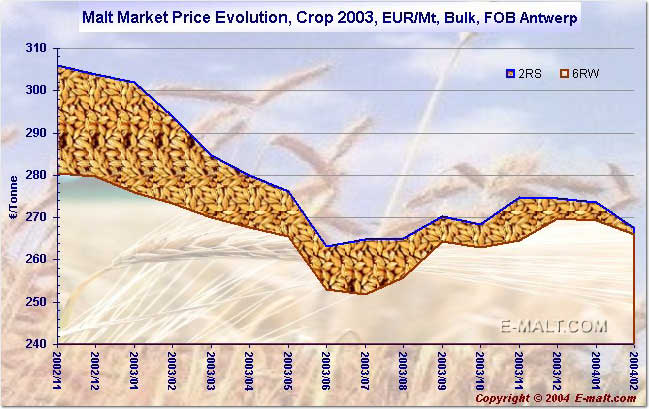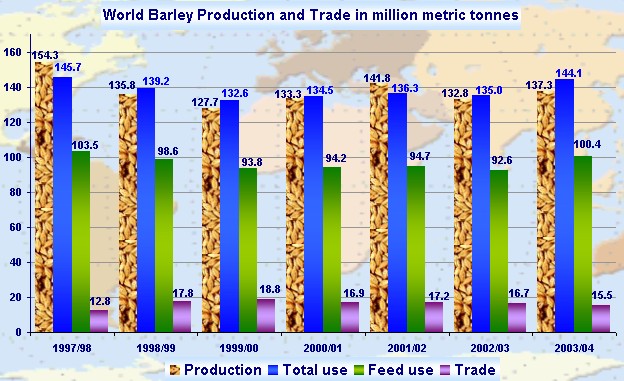|
Top Industry News
Nepal: The Department of Revenue has finally corrected the wrong done to the beer manufacturers of Nepal
Click here
The Danish brewing force, Carlsberg Breweries A/S, announced on December 23 a public offer for shares in Carlsberg Okocim S. A. through the Polish stock exchange
...
Click here
A survey conducted by Kirin on the amount of beer and happoshu drunk across the world in 2002 found that about 141.56 billion liters had been consumed
...
Click here
The recently published World Drink Trends 2003 survey reveals this year that more than ever Europeans continue to out-drink the rest of the world
...
Click here
After the resultless WTO-meeting in Cancun a number of countries concentrate on concluding bilateral trade agreements
...
Click here
The International Grains Council and the Food Aid Committee held their regular sessions in London on 8 - 9 December 2003
...
Click here
Russian barley exports in July-October were 1,635 Mill. tons. Total grain exports to-date are said to be 3.5 million tonnes
...
Click here
More news is available on site www.e-malt.com
-
Many German beer firms will look back on 2003 and want to drown their sorrows after a difficult year
...more info
-
UK: A specialised Suffolk brewery based in St Peter's is aiming to increase its sales to £10m within the next five years
...more info
-
Canada: Effective January 12, 2004, Sharon McShane will be acting Chief Operating Officer for the Canadian Grain Commission (CGC)
...more info
-
Luxembourg: Quilmes Industrial (Quinsa) S.A. announced on December 23 that, following the substantial completion of the market purchase program previously authorized by the Company
...more info
2. Brewery News
Nepal: The Department of Revenue has finally corrected the wrong done to the beer manufacturers of Nepal. Nearly three years after the imposition of the additional duty of 75% on beer import, and persistent requests by the Nepal government to correct the violation of the free trade agreement, the notification to end the additional duty on beer of Nepal origin was issued on December 17, The Economic Times reported on December 24.
The Nepal Free Trade notification exempts basic duty on all manufactured goods. Beer is specifically included for exemption, but alcoholic beverages as such must pay full duty. Before the imposition of the 75% additional duty, import was charged under the respective state excise system at the stage of clearance from the customs bonded premises since the power to tax alcoholic preparations is in the state list in the Indian Constitution. Nepal beer and Indian beer were subject to same tax rates and could compete on common ground.
Union Breweries and Shaw Wallace have set up beer plants in Nepal based on the duty-free import in India on beer of Nepal origin under the Free Trade Agreement (FTA) between the two countries. Nepal brands like Gorkha and Mount Everest too found a market in India, thanks to FTA. However, the plants shut down or went sick after the 75% additional duty measure, originally designed to hurt European liquor, dried up the flows of beer from the Himalayan kingdom. It took a lot of convincing and appeals to RTR (Royalty-to-Royalty) links between Nepal and India to get the Indian government to correct the wrong. The Indian distilleries too raised the usual cries of “foul” and “unfair competition” to keep Nepal beer out...more info
The Danish brewing force, Carlsberg Breweries A/S, announced on December 23 a public offer for shares in Carlsberg Okocim S. A. through the Polish stock exchange in Warsaw. The price per share is 25.50 zloty (approx. DKK 41), and the offer is open from 30 December 2003 until 16 January 2004.
On 15 December this year, Carlsberg Breweries increased its shareholding in Carlsberg Okocim to 85 per cent and the public offer is a natural continuation of Carlsberg Breweries' strategy to increase its shareholding in its most important breweries. The remaining 15 per cent of the share capital equals 4,316,756 shares.
A survey conducted by Kirin on the amount of beer and happoshu drunk across the world in 2002 found that about 141.56 billion liters had been consumed. It was the 17th year in a row that world consumption rose, climbing above the previous year's figure by 2.1 %. Converted into large bottles of beer, about 22.36 million bottles were drunk. That is enough to fill Tokyo Dome about 114 times, Kirin said under Wire reports, Japan on December 26.
The number one beer-consuming country was the United States, which reportedly consumed about 23.82 billion liters. The number two beer-consuming country is China, where 23.49 billion liters was drunk during 2002, an increase of 4.7% compared with the previous year. The third one is Germany with 10.04 billion litres, and then comes Brazil with 8.35 billion litres. The number five beer-consuming country is Russia with 7.08 billion litres of beer.
By country, Japan ranked at No. 6 in total beer consumption, at 6.93 million kiloliters, after dropping 2.6 % from 2001 and falling behind Russia, where popularity of drinks with an alcohol content lower than that of vodka is reportedly increasing.
The amount of beer consumer per person was highest in the Czech Republic, which consumed about 249 large bottles per person -- about three times the amount in Japan. Second and third were Ireland and Germany, respectively. Japan was 25th in personal consumption, at 85 bottles per person.
The recently published World Drink Trends 2003 survey reveals this year that more than ever Europeans continue to out-drink the rest of the world.
No other continents are represented within the total consumption top 20 this year. Luxembourg remains at the top of the table despite recording a 6% decrease in consumption from 2001. The UK, on the other hand, saw a 1.2% rise in consumption in 2001 to 8.5 litres of pure alcohol per head, moving it up to 14th place. The USA's consumption levels remain the same, keeping it in 26th place, and New Zealand is now the highest ranking non-European country in 21st place. Overall there seemed to be a global decline in alcohol consumption in 2001 with just 12 countries seeing an increase.
Once again the Czechs and the Irish continue to top the beer consumption table despite their consumption falling by 1.4% and 0.9% respectively. The UK's beer consumption increased 1.8% in 2001, the first increase since 1997. However this made no impression on it's ranking, and the UK remains in 8th position again.
Russia has taken back the top spot in Spirits Consumption for 2001, with 6.3 litres of pure alcohol consumed per head, topping an all Eastern European top 5. Thailand is the highest non-European country, but although figures remain at a steady 3.5 litres of pure alcohol per head it has been pushed out of the top 5 this year. The UK has dropped to 31st place with a 6.3% fall in consumption, amounting to just 24% of Russia's total intake. Cyprus saw the biggest increase in 2001, with an impressive 18.5% rise...more info
4. Barley News
The International Grains Council and the Food Aid Committee held their regular sessions in London on 8 - 9 December 2003. The Secretariat, as part of its ongoing survey of barley trade, reported on its preliminary analysis of developments in key malting barley markets. It noted that world beer production (the chief end-use of malting barley) had increased by 19% in the last ten years, boosted by quickly rising per capita consumption in lower and middle income countries, many of which had the potential for further growth. Imports of malting barley and malt by those countries were rising, with China alone now accounting for over 2 million tonnes of malting barley imports annually. On the other hand, beer markets in most developed countries had reached maturity, and falling demand had seen the brewing sectors contract in some countries, cutting domestic barley malt requirements. However, some countries, including Australia and Canada, had expanded their malt exports.
Russian barley exports in July-October were 1,635 Mill. tons. Total grain exports to-date are said to be 3.5 million tonnes, and the Moscow Ministry warned that there will be an export tax or quotas, once the maximum export target of 5 million tonnes is surpassed. Also in Russia stocks are becoming tight and markets are firm. We do not expect exports of barley to be higher than 2.0 – 2.2 million tonnes.
|



 Go to our news database with 1855 articles
Go to our news database with 1855 articles





